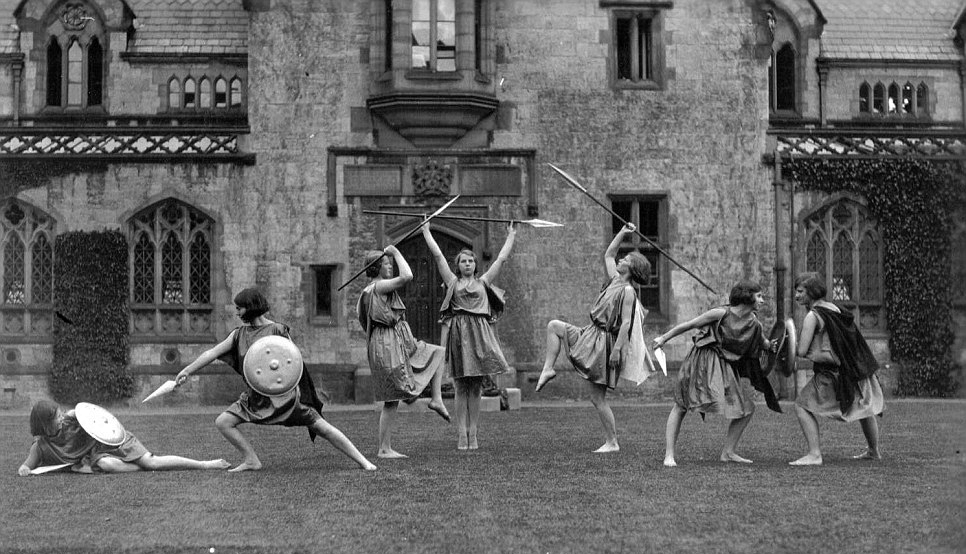First spotted on Reddit with the title “Pupils at Howell’s Girls’ School in Denbigh, north Wales, perform Shakespeare’s ‘As You Like It’ during the 1930s”, apparently from this January 2013 news story. But I only have one question.
Author: duane
Those Two Guys
Everybody know what TV Tropes is? Technically it’s like a Wikipedia for movie and television cliches (imagine an encyclopedia of variations on “jumped the shark” cliches). Depending on who you ask it’s also Internet quicksand, guaranteed to cost you hours of time should you happen to stumble upon a link.
Good news! I’ve escaped with some Shakespeare. Specifically this idea of the “Those Two Guys” trope. Definition, you say?
Two characters, usually in a school setting, to be the mundane Greek Chorus. They may or may not be snarky and unlike the Greek Chorus, they don’t break the fourth wall very often (if at all). They’re completely ordinary… and no, we don’t mean as in the Ordinary High-School Student, or the Badass Normal. They’re ordinary. Often the best friends of the main character (who is an Ordinary High-School Student) before all the weirdness with aliens, robots, magic, demons, harems, etc.
Some pairs become involved in the plot less and less as the series progresses, especially if the plot becomes more serious. Given what usually happens to people involved in the plot, it’s probably for the best. However, it’s not uncommon for Those Two Guys to also become popular and even iconic characters in the series.
Their personalities usually sharply contrast, e.g. calm/hyper, jock/geek, etc., or their appearances contrast, e.g. short/tall, thin/fat… When they don’t, they will be exactly the same. They might even wear Coordinated Clothes. Their names are often esoteric (either too complex or too simple to stand out), plus their non-involvement with the plot usually results in them being called “Those Two Guys”.
Here’s where it gets interesting, over on the Theatre page, where we learn that the original pair of Those Two Guys was none other than the “unintentional evil minions” Rosencrantz and Guildenstern. I guess, looking at the “it’s always X except for when it’s the complete opposite” definition above (“they’re sharply contrasted unless they’re exactly the same / they’re involved less and less in the plot unless they become popular and iconic characters, etc…) it’s hard to argue that R&G do not fit. (Of course they can’t fail to note that Timon and Pumbaa from the Lion King are also based on Rosencrantz and Guildenstern. This “those two guys” thing might be the only thing that they have in common!.)
But it wouldn’t be TV Tropes without lots of examples. How about …
Sir Toby Belch and Sir Andrew Augueface from Twelfth Night?
Trinculo and Stephano from The Tempest?
Ross and Lennox (or Lennox and Angus) from Macbeth?
Benvolio and Mercutio from …
..wait, what? Mercutio? MERCUTIO? The page does mark this as a special case, however — it’s “somewhat off” because both of them are “somewhat relevant” to the story. Oh, well, at least they cleared that up. Somewhat.
I’m thinking they could shorten that original definition to “any two guys that typically have a scene together.”
There’s a Shakespeare Geek Born Every Minute
Today I learned something. Always a good day when that happens.
Today I learned that the Shakespeare Birthplace — as in, the home where our beloved playwright was born — was almost shipped to the United States, brick by brick, in the 1800s. The mastermind behind this plan was none other that P.T. Barnum, who is perhaps best known as one half of the famed Barnum and Bailey Circus. It’s also a famous quote of his that I borrowed for the subject line : there’s a sucker born every minute.
I wonder if Barnum was a little like the Donald Trump of his day? Sees something he likes, and more importantly something he can own for himself and make money from, and says, “How much? Name your price.” We can assume that he would have stamped his name on it as soon as the last brick was placed in New York. P.T. Barnum presents William Shakespeare’s Birthplace.
Alas, Barnum was foiled in his attempt by, in his own words from his 1855 memoir, “some English gentleman who got wind of the deal” and got some friends together to buy the house for 3000 pounds, keeping it in England.
That English gentleman’s name?
Charles Dickens.
And now you know…..the rest of the story.
Shakespeare Geek Readers Get 15% Off A Shakespeare T-Shirt from Litographs! Limited Time Offer!
Check out their entire collection (which contains many more classic books, not just Shakespeare). Designs are both back and front and I believe contain the entire text of the play, and really do look to be quite the conversation starter. Can’t wait to get one.
BONUS! Now until midnight on Sunday (July 19) use promo code SHAKESPEAREGEEK and take $5 off your order! That’s 15% off the single shirt price!
(Disclaimer – I’m getting no kickbacks here. I actually asked if they had an affiliate program, and they do not. I’ll most likely be getting the Tempest shirt for myself!)
Did You Get To Ask Sir Ian McKellen Anything?
Despite the recent drama, reddit (“the front page of the internet”) has become famous for what it calls the AMA (“ask me anything”) segment where they frequently score impressive celebrities, including Arnold Schwarzenegger and President Barack Obama. I sometimes check the upcoming schedule to see if there’s anybody worth camping out and waiting for, but rarely do I remember to do anything about it. They typically last an hour, and you usually have to post your question well ahead of time to get it seen above the noise, so if you’re not on top of your game you’ll miss it.
“I met Patrick in Stratford-upon-Avon when we were both working in the theatre there doing Shakespeare. In about 1976.”
Have you talked to Michael Fassbender (your younger Magneto self) in regards to him playing MacBeth?
You don’t want to be bothered with what someone else did. You want to do your own performance.”
Is there a character that you’d like to play before you retire from acting?
Have you ever had bad luck when saying the title of the Scottish Play?





